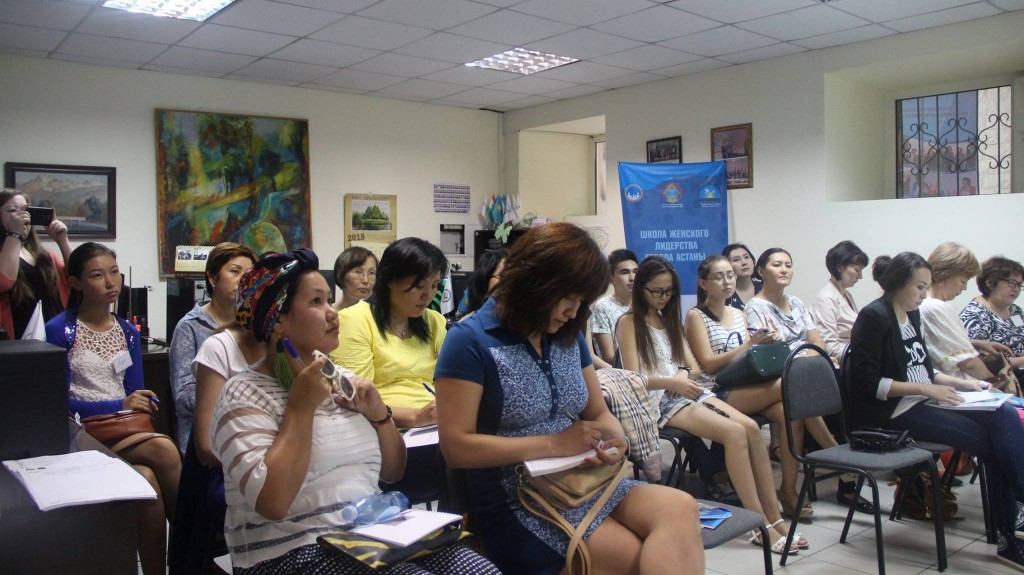ASTANA – A public speaking skills seminar was held Aug. 1 within the Women’s Leadership School and supported by the city’s internal policy state management institution.

Participants listen at the Aug. 1 public speaking skills seminar of the Women’s Leadership School, coached by Svetlana Kaplina.
The workshop was aimed at teaching talents to potential women leaders such as preventing fear of public speaking, using body language, setting correct physical posture, keeping the person’s attention, improvising on any subject, storytelling, giving toasts and working with difficult audiences, according to a report on Kazakhstan’s Union of Women Entrepreneurs website.
The participants stressed the need for activities on improving and exploring women’s leadership potential. In addition to acquiring new information, those involved established business relationships andintend to continue working together towards improving their leadership abilities.
Svetlana Kaplina, a leading coach and licensee of rhetoric and public speaking skills at a university in Moscow, director of the Profi Training Educational Technologies Centre and member of Kazakhstan’s Union of Women Entrepreneurs, spoke about her work experience, audience activity and feedback on seminars in an interview with The Astana Times.
What are the results of your seminars on public speaking?
“People stop being afraid, easily get in touch, are capable of convincing and ready to improve their public speaking skills – these are the most important results. For example, a programming graduate, basically a closed type of person who does not have a natural confidence, by utilising all the options taught during the training, successfully passed an interview and received a job at Nazarbayev University. That is, people improve communication skills, learn to negotiate and find common language to achieve their goals through persuasion.”
What activity is observed in seminar participants? What are your expectations for them?
“The activity went very well. A friendly, inspiring and motivating-for-change atmosphere created during the training is one of our achievements. After training, a lot of listeners become friends and find business partners. A willingness to change is my most important expectation from participants. If people are really willing to do something to change their lives for the better, then that’s great!”
Do you conduct seminars on other subjects? What are your experiences in these areas?
“We have trainings on leadership, management skills and intelligence maps (mind maps) that focus on training the ability to negotiate in order to reach an agreement that would suit both sides while maintaining a relationship and achieving a result. A separate project – Leadership School for Teenagers – is like a mini MBA programme for children, where teenagers learn important and useful life skills which unfortunately are not provided in schools.
I have been working as a business coach since my years as a student and have extensive experience in public and political activities. I was the head of a public organisation, held a lot of trainings and education for young people, did leadership teaching and had an active citizenship position within community service. Now I’m in business with my husband; we have several directions that we are actively engaged in and developing.”
Founded July 4, 2002 Kazakhstan’s Union of Women Entrepreneurs is a non-profit organisation created mainly to enhance the participatory processes of women in economic and social life, develop democracy and form an active civil society in Kazakhstan.
In 12 years, the organisation has trained more than 10,000 women, including those in rural areas who received education and skills in the field of entrepreneurship. Through the organisation’s help, 23 women entrepreneurs obtained credits in the amount of $115,000 and over 4,000 women received microcredits totaling $88,815 to open their businesses, according to the organisation’s website.

